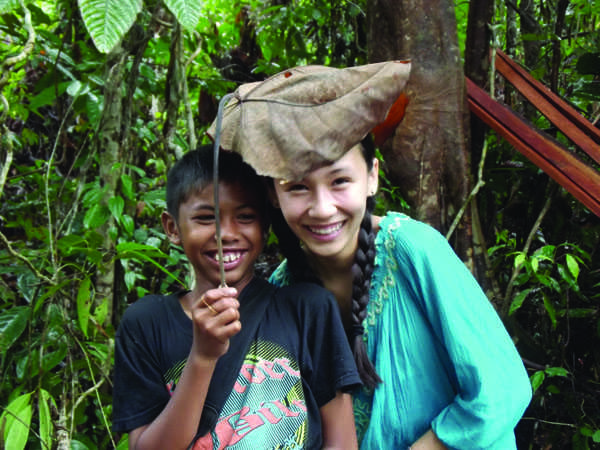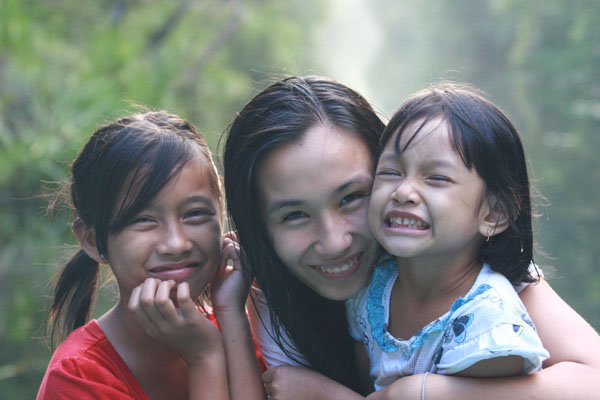Ana Sofía Wang and two girls from ASRI Kids bond while working to restore the environment.

Ana Sofía Wang experienced a life changing moment while hiking in a remote Indonesian rainforest with kids from a nearby village.
“We heard the faster kids up ahead, it sounded like they had stopped, “Ana Sofía, a Palo Alto High School sophomore recalls. “[A] tree was there, or some of it, the stump was huge, almost 12 ft across… Directly in front were more trees piled on top of each other and around them, other trees standing,”
The tree was over 300 years old, the oldest in the park, and it had been cut down.
“Seeing the tree changed all of our lives, mine, the kids, the other volunteers,” Ana Sofía says. “It was horrifying to think that this tree that had stood there for 300 years could be cut down in 20 minutes.”
Two summers ago, Ana Sofía, and her sister, Lucia, currently a sixth grader, founded an organization in Indonesia after observing the necessity of environmental initiative and perils of forgetting the earth’s needs. Alam Sehat Lestari [ASRI] Kids, the program they started, educates the children of Sukandana, Indonesia, about the importance of wildlife conservation. In Indonesian, “alam sehat lestari” means “healthy and everlasting nature.”
Through classroom activities and interactive means, ASRI Kids educates children of Indonesian villages that border Tanjung Puting National Park about the necessity of conserving their natural resources.
According to ASRI and Health in Harmony, partner organizations that ASRI kids stemmed from, protection of the rainforest is vital because the health of the environment is directly linked to health of people.
To expose the local children to their surroundings, ASRI Kids takes field trips to nearby parks and experiences firsthand the environment they have become invested in protecting.
Over the summer, for the final trip, a few kids from the program were selected to visit the national park with Ana Sofía and Lucia.
“Of the 30 kids who came daily to the classes, we got 20 written essays from kids who wanted to go on the trip to the national park,” Ana Sofía says. “Of those 20, we had to narrow it down to the 11 kids we finally brought.”
Ana Sofía and her sister developed the idea for ASRI Kids while spending the summer with their mother in Indonesia two summers ago when she volunteered as a doctor for ASRI. Ana Sofía and Lucia originally worked with the main ASRI program.
“[ASRI] is associated with a conservation program that includes an organic farm, where I thought Ana Sofía and Lucia could participate while I worked as a doctor,” Ewen Wang says, Ana Sofía’s mother.
At first, Ana Sofía was reluctant to spend the summer, away from friends, in a country halfway around the world. Her opinion changed, however, when she and her family “started hanging out with the people.” She loved being with the kids despite the language barrier.
“Without speaking each others’ languages, after two or three weeks, somehow, all the kids would gather at the porch of our little house and mime their way through jokes, and games and go for walks in the forest,” Ewen says.
After connecting with the local children during their first summer in Indonesia, Ana Sofía and Lucia wanted to do something to help educate the kids about the environment they live in. According to Ewen, experiencing a different, less privileged world spurred the creation of ASRI Kids.
“What inspired ASRI kids was realizing that as foreigners we were very privileged to be able to experience the wonders of the rainforest, while the local people did not have the means to learn about or visit the national park near their village,” Ewen says.
Ana Sofía explains the steps she and her sister took in creating the organization.
“As soon as we got to an airport with Wi-Fi, we wrote an email to the co-founders of Health in Harmony, Kinari Webb and Hotlin Ompusungu, pitching them our new idea to have a project [that] incorporated conservation with education,” Ana Sofía says.
Once the founders supported the idea, the girls began assembling the project.
“From there on, we did the fundraising from home; emails to friends and family, selling cards and photographs,” Ana Sofía says. “Every month we would report how much money we had fundraised.”
Even now, Ana Sofía touches base with the program regularly.
“Every afternoon I answer emails and [I spend] a few hours on the weekend [working for ASRI Kids],” Ana Sofía says.
But the time spent has been a small price to pay, according to Ana Sofía, who considers herself lucky to have such an experience.
“The whole experience has had an amazing impact on my life and I am incredibly grateful for it,” says Ana Sofía. “This trip really made me realize how lucky I am to have that opportunity and to be able to make a difference in peoples lives.”
Ana Sofía reflects on what the experience has taught her about the privileged life she leads.
“It made me realize that we take for granted the amazing education we have,” Ana Sofía says. “My hope is that this program not only impacts my life but also the lives of the children of [Sukandana] and that they are able to make decisions about protecting their rainforest in the future.”
Ewen remarks on the changes she has seen in her daughters since the founding of ASRI Kids.
“I think Ana Sofía and Lucia are more confident in their abilities, but more importantly it is a project that enabled them to give back to a community across the world that embraced them,” Ewen says.



